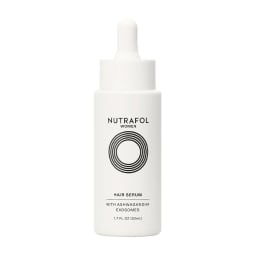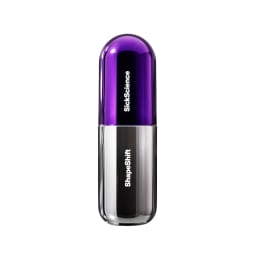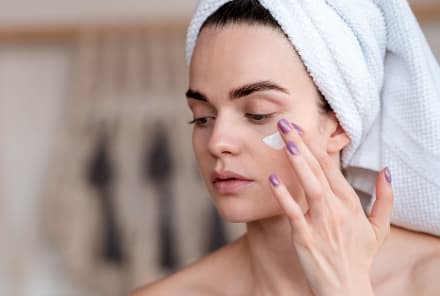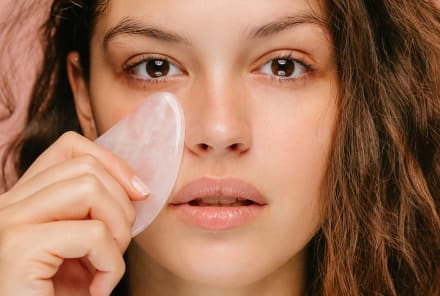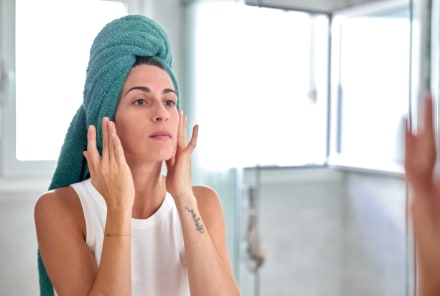Advertisement
Everything You Need To Know About Exosomes In Skin Care

Hannah Frye is the Assistant Beauty Editor at mindbodygreen. She has a B.S. in journalism and a minor in women’s, gender, and queer studies from California Polytechnic State University, San Luis Obispo. Hannah has written across lifestyle sections including health, wellness, sustainability, personal development, and more.
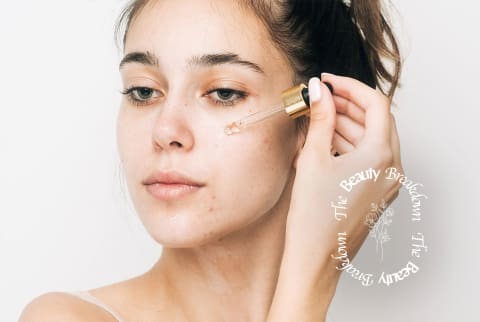
In the realm of skin care, certain principles are straightforward. When your skin feels dry, you reach for moisturizer. Ahead of a day under the sun, sunscreen is a must. And the inclusion of retinol in a healthy aging routine has become almost second nature to many. However, some concepts remain elusive, and exosomes are a prime example.
As a beauty editor accustomed to testing cutting-edge products, delving into the world of exosomes demanded more thorough investigation than usual. It's a relatively new topic in the beauty space, so there was a lot to get caught up on. But let me assure you: The deep dive was more than worth it.
Clearly, exosomes are a new frontier in skin care technology, and many questions remain unanswered. Nonetheless, they show promise in promoting skin healing and rejuvenation. Allow me to elaborate.

The 101 on exosomes
Think of exosomes as messengers, tiny carriers delivering vital nutrients to your skin and serving as the primary communicators between your cells.
Once applied—whether in a professional setting or at home with trusted over-the-counter products—exosomes are absorbed by target cells at damaged tissue sites, delivering their molecules to stimulate anti-inflammatory and regenerative effects. Once there, they encourage the skin to regenerate components of the skin that may be lost or damaged, such as collagen, elastin, ceramides, and so on.
These are "messengers that can really impact the body, sending cellular signals to increase collagen and other rejuvenative changes," notes board-certified holistic plastic surgeon Anthony Youn, M.D.
To enhance absorption, some experts advocate applying exosomes after procedures like microneedling or laser treatments. Others apply them post-procedure not solely for absorption but also because exosomes aid in skin healing following treatments.
What's more, exosomes are unlike many other treatments for aging skin (think retinol, glycolic acid, and so on) in that exosomes soothe the skin, not irritate it. So, for folks with highly sensitive complexions who have been met with rashes or redness when testing classic aging serums, this is a particularly fitting option.
But where do exosomes come from?
Exosomes can be either synthetically produced or derived from stem cells. Stem cells can be sourced from a variety of places, including plants, animals, and yes, humans.
Now, the notion of human-derived exosomes might raise eyebrows, and I was certainly puzzled by it initially. Certain skin care products, like the ExoCel Bio serum used in dermatology offices, utilize exosomes derived from mesenchymal stem cells, isolated and expanded from a specific layer (the chorion) of healthy, donated human placenta. Naturally, these placentas undergo rigorous screening for communicable diseases and pathogens.
Celebrity esthetician and founder of her namesake beauty brand Angela Caglia sheds light on the rationale behind using human-derived exosomes: Since human skin originates from mesenchymal stem cells, she says, it's logical that it responds favorably to exosomes derived from the same source. Caglia even incorporates human-derived exosomes from adipose tissue into her topical, over-the-counter product called the Cell Forte Serum.
What benefits can you expect from these regenerative properties?
As noted, exosomes are used for the regenerative properties. Here's what that means when you actually get down to it:
- Reduced wrinkles and fine lines: Research shows that these can help smooth fine lines1, thanks to their ability to boost collagen.
- Improve healing time: Lots of experts use exosomes after treatments or procedures to enhance the recovery process. Because the exosomes are messengers to kick off the body's recovery process, they stimulate and speed up healing time. Even without "work," they can help address skin damage.
- Heal acne scars and sun damage: As noted, these healers can address past damage1. Research shows that they can help smooth acne scars and can even address damage from UV exposure.
- Improve water retention and skin barrier function: Because exosomes stimulate lipid and protein production1, they can help fortify and strengthen the skin barrier. This leads to improved water retention and reduced transepidermal water loss. Read: They can help keep your skin hydrated and plump.
- Enhance skin protection and reduce environmental damage: The components of exosomes have been shown to help the skin protect itself from environmental stressors1. This in turn can help reduce dark spots, texture changes, and so on.

Arguments against topical exosomes

3 things we're getting wrong
To make things even more clear, here are a few misconceptions to be wary of:
- Assuming in-office and OTC exosomes are the same: If we assume that in-office and over-the-counter (OTC) exosome treatments are identical, board-certified dermatologist and board director at ExoCel Bio Marina Peredo, M.D., FAAD, suggests otherwise. According to her, professional-grade exosome treatments are notably more effective in repairing damaged cells. She explains that in-office treatments contain non-lyophilized exosomes, which are more potent as they remain intact upon reaching the skin. However, these treatments require storage at temperatures ranging from -20 to -80 degrees Celsius.
- Declaring plant-based exosomes are useless to humans: Most experts I interviewed agree that human-derived exosomes are likely the most effective, but plant exosomes do hold benefits as well, especially when it comes to sustainable practices and budget-friendly options.
- Thinking they're only used in skin care: Exosomes are also hugely beneficial for hair growth. They're typically applied in-office and should be used primarily by those aiming for hair loss prevention and showing only early signs of loss and shedding, says hair restoration expert and surgeon Marc Dauer, M.D.

The 3 steps you need to know
Now that we've covered the myths, let's get into the best steps for incorporating exosomes in your beauty routine should you feel inspired:
Do your research before investing
When searching for a great exosome treatment or product, you should prioritize proven results. Look for clinical study results (photos are a plus) as well as clear messaging as to where the brand or office sources their exosomes.
Know what you're looking for
If you go into exosome research without a skin or hair growth goal in mind, it's difficult to know what kind of product or treatment will help. Want to address fine lines and wrinkles? Ease discoloration? Speed up healing? Some products are designed to target some concerns and not others, so it's helpful to know what you want from the start.
Don't be afraid to ask for help
Exosomes, like any ingredient in skin care, won't be a magic bullet for anyone. In fact, there are plenty of other ingredients that may be a better fit for your skin concern at hand. Before investing, it's worth asking your dermatologist or esthetician if it's worthwhile, especially if you plan on pouring money into a treatment or high-end product.

3 extra tips
Here, how to get more out of your exosome product or treatment:
- Look for additional ingredients: If you're going to invest in an OTC exosomes product, make it worthwhile by seeking out additional ingredients prime for skin rejuvenation. Keep your eyes peeled for peptides, hyaluronic acid, ceramides, and antioxidants.
- Take instructions seriously: Like many topical skin care products, exosomes take time to work. If the product or treatment you're investing in suggests using it for a few months before expecting noticeable results, follow through with that directive.
- Address collagen degradation from within too: Many people seek out exosomes as a way to get a "facelift in a bottle," which isn't entirely unjustified, as they are powerful for skin rejuvenation. However, your body's natural production of collagen will decline with age (exosomes or not), so consider boosting that function from within by adding collagen supplements to your well-being routine too—here's a list of expert-approved products to consider.
A final reminder

The best OTC products
Pros
- Lightweight formula
- Uses upcycled ashwagandha seeds
Cons
- Pricey
Key ingredients:
Ashwagandha exosomesPanthenolPea sprout extractFor those seeking the hair-related benefits of exosomes, consider this plant-based option from Nutrafol. The brand uses upcycled ashwagandha seeds to extract exosomes (the same ashwagandha used in their other products) and combines them with Irish moss peptides and a handful of other plant extracts. The formula has been shown to reduce visible breakage, increase visibly thicker hair volume, and improve visible hair quality—so yes, it goes far beyond just supporting hair growth.
Pro
- Visibly defines jawline
- Vegan-friendly exosomes
Key ingredients:
Pineapple exosomesNiacinamidePeptidesGiven the advanced technology housed in this bottle and the astounding before and after images, it's pretty shocking that it retails for $58, compared to counterparts that cost upwards of $500. SickScience's exosomes—called NX35—specifically instruct fat cells to naturally release lipid droplets (which handle fat storage), thus revealing a more sculpted and lifted jaw and neck area over time. Want to learn more? Read an in-depth review from mindbodygreen's senior beauty editor Jamie Schneider here.
Advertisement
Best for aging skin & hyperpigmentation: Angela Caglia Cell Forté Serum
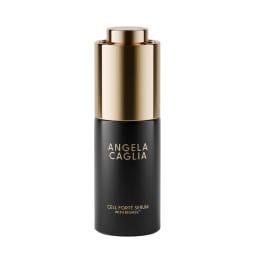
Pro
- Clinically proven to ease hyperpigmentation and fine lines
- Tremella mushroom boosts hydration
Cons
- Pricey
Key ingredients:
NiacinamideHuman-derived exosomesAllantoinAs mentioned previously, Caglia utilizes human-derived exosomes from adipose tissue combined with other science-backed ingredients to revive and brighten skin. Reviewers of this award-winning serum declare the product "next level" and call it a "magic potion" due to the handful of benefits it brings to a dry and dull complexion.

The takeaway
In the ever-evolving world of skin care, exosomes emerge as a revolutionary concept. Acting as potent messengers between cells, they hold promise for skin healing and rejuvenation, whether utilized in professional settings or through over-the-counter products. However, understanding their intricacies and navigating the diverse array of available options is key to unlocking their full potential in your beauty routine. Here, more on the reality of topical "face-lifts" and other ingredients to consider.
Meet The Experts
Hannah Frye is the Assistant Beauty Editor at mindbodygreen. She has a B.S. in journalism and a minor in women’s, gender, and queer studies from California Polytechnic State University, San Luis Obispo. Hannah has written across lifestyle sections including health, wellness, sustainability, personal development, and more.
Watch Next
Enjoy some of our favorite clips from classes
Enjoy some of our favorite clips from classes
What Is Meditation?
Mindfulness/Spirituality | Light Watkins
Box Breathing
Mindfulness/Spirituality | Gwen Dittmar
What Breathwork Can Address
Mindfulness/Spirituality | Gwen Dittmar
The 8 Limbs of Yoga - What is Asana?
Yoga | Caley Alyssa
Two Standing Postures to Open Up Tight Hips
Yoga | Caley Alyssa
How Plants Can Optimize Athletic Performance
Nutrition | Rich Roll
What to Eat Before a Workout
Nutrition | Rich Roll
How Ayurveda Helps Us Navigate Modern Life
Nutrition | Sahara Rose
Messages About Love & Relationships
Love & Relationships | Esther Perel
Love Languages
Love & Relationships | Esther Perel
